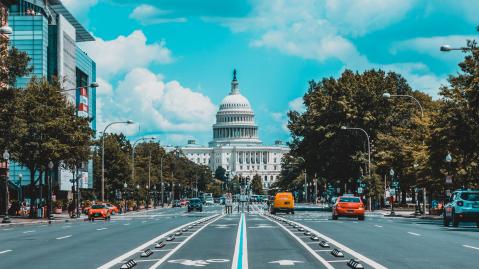
Washington DC, USA
On 10 June 2021, the four signatory jurisdictions of the Transport and Climate Initiative Program (TCI-P) (Massachusetts, Rhode Island, Connecticut, and Washington DC) released a final Model Rule for the implementation of the multi-state program aimed at reducing emissions from the transportation sector in the participating states from 2022, although Connecticut halted participation in the program for now.
The Model Rule comes after a public comment period and is largely based on the draft Model Rule from March 2021. According to the final Model Rule, the TCI-P will start with a cumulative cap of 42.1 MtCO2 in 2023 (cap without Connecticut in case of definitive halt of participation: 28.6 MtCO2), declining by 30% until 2032 in equal increments each year. This would result in a 26% emissions reduction below 2022 levels by 2032.
Compliance obligations fall upstream, to firms that supply the covered fuels within the participating states. All allowances will be allocated via quarterly auctions with a reserve price of USD 2.76 that increases annually by 2.5%. TCI-P will also introduce an Emissions Containment Reserve (ECR) and a Cost Containment Reserve (CCR) with a trigger price of USD 6.60 for the ECR in 2023 and USD 12 for the CCR in 2023, both increasing annually by 7%. While the CCR releases additional allowances for sale at auction when the CCR trigger price is reached at auction, the ECR withholds allowances when prices at auction fall below the ECR trigger price. As in the Regional Greenhouse Gas Initiative, a regional carbon market covering the power sector, which includes some of the same participating states and adopts similar design elements, participating entities can use offsets from forestry, landfill methane capture, and avoided methane emissions from agricultural manure management to fulfill up to 3.3% of their compliance obligations per three-year compliance period.
Compliance entities must register with the Transportation Registration, Emissions, and Allowance Tracking System (TREATS) to establish an emissions reporting and compliance account. The final Model Rule also contains further provisions such as on banking of allowances (no limit); revenue use (35% by each state to be invested in equitable, less polluting, and more resilient transportation); and monitoring, reporting, and verification (MRV).
Along with the final Model Rule, TCI-P released further documents for public comment by 13 August 2021: a Draft Framework for Public Engagement including guiding principles for TCI-P jurisdictions when conducting outreach and public engagement, a Draft TCI-P Model Implementation Plan providing a common framework for jurisdictions to follow in developing their own Implementation Plans, and a Draft Proposed Strategies for Regional Collaboration summarizing a range of additional policies and programs that current TCI-P signatory jurisdictions are proposing.
The signatory jurisdictions of Massachusetts, Rhode Island, Connecticut, and Washington DC hope that more states will be encouraged to join the program. Delaware, Maryland, New Jersey, New York, North Carolina, Pennsylvania, Vermont, and Virginia have participated actively in developing the TCI-P and can join the program in the future. Most of the above-mentioned jurisdictions are currently RGGI participants.
Over the rest of 2021 participating jurisdictions are expected to pass their own implementing legislation that aligns with the model rule. They are then expected to start implementing the program in 2022 by reporting of emissions and fuel shipment data, with the first three-year compliance period starting January 2023.
However, on 4 June 2021 Connecticut has halted participation in TCI-P for now after the state legislature failed to pass implementing legislation during the state’s annual legislative session. Lawmakers from both Democrats and Republicans expressed concerns about increasing gasoline prices. Connecticut is still a signatory state of TCI-P but while its halt of participation prevents the state from implementing the program in the short term, it can still pass implementing legislation and join TCI-P in the future.
